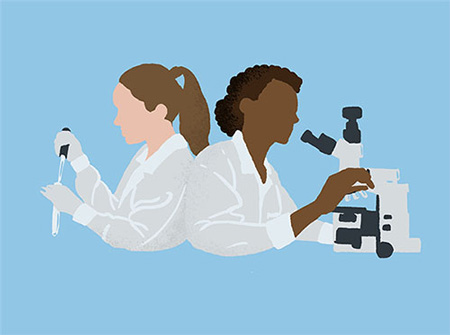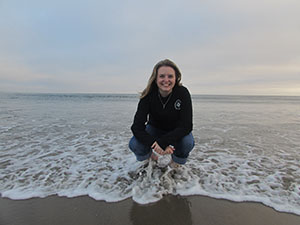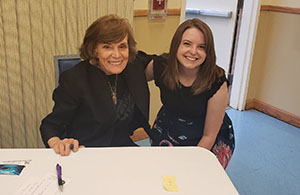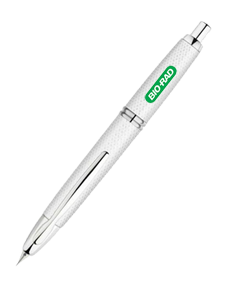
Popular topics

Voices of Women in Science: Olivia Blondheim

As part of International Day of Women and Girls in Science, Bio-Rad invited researchers to share their own experiences of being a women in science. In this article, we speak to Olivia Blondheim, a PhD Student at the University of South Florida’s College of Marine Science.
Olivia shares her experiences of changing PhD direction, her love for marine biology, and the importance of great mentors in helping you establish yourself as a researcher.
Bio-Rad (BR) When did you first become interested in a career in science?
Olivia Blondheim (OB): I was always a very curious child and I wanted to learn everything I could about the natural world. My mom often says I knew I wanted to be a marine biologist by the age of 5. Throughout my late elementary and middle school years, my interest in science developed further through participating in an annual summer program, where I had the chance to conduct my own scientific research projects under the guidance of experts.

Olivia Blondheim. Photo credit: Hillary Thalmann.
BR: Can you describe your career path?
OB: After high school, I attended Drew University in Madison, New Jersey, where I pursued majors in Biology and Spanish. During my first year, I met Dr. Tammy Windfelder, who became an incredible advisor, mentor, and friend. After working with her in the field for one summer studying the small mammal population in the forests of New Jersey, I realized that my true research interests were in the marine sciences. Throughout the rest of my undergraduate career, I participated in amazing research programs that helped me gain the experience I needed to pursue a career in this field. From researching jellies off the Oregon Coast, to diving and snorkeling through coral reefs and mangrove forests in Bonaire and Belize, I had found my calling as a marine biologist. In Fall 2018, I started my doctorate in Integrative Biology at the University of South Florida. This past Fall, I decided to transfer to the University of South Florida’s College of Marine Science to continue my PhD studies.
BR: Have you encountered any challenges along the way and if so, how did you overcome them?
OB: Recently, I made the decision to transfer to a new PhD program and lab. It was one of the most difficult decisions I have ever had to make and it required a lot of self-reflection. In many ways, my research interests had changed from when I first started my degree and I was not learning and growing as a person and a scientist as much as I wanted. When the global pandemic put a stop to any possible field research, these issues became more apparent and I had to re-evaluate why I was pursuing my doctorate. The only way I was able to overcome this challenge was through my incredible family, friends, and mentors who advocated for me every step of the way. Through this process, they also helped me to identify and articulate my values, which allowed me to find a work environment that equally valued mentorship and community. What became my scariest risk ended up leading to my greatest reward, and I am starting to regain the confidence in my ability to become a great scientist. I am incredibly fortunate that I had such an amazing support system that stepped in and prevented me from slipping through the cracks of academia, and I hope to use my experience to help support other women and minorities in STEM.
BR: Can you tell us about your current research?
OB: Although I am currently exploring new directions for my research, I would like to investigate the potential impact of the poleward expansion of mangroves on the dynamics within marine communities. While mangroves typically are limited by temperature and grow at tropical and subtropical latitudes, with changes in climate and fewer extreme cold events, many mangroves are expanding into regions that were previously dominated by salt marshes. I hope to explore how this poleward expansion of mangroves may impact predator-prey interactions and energy transfer within marine ecosystems.
BR: What has been your career highlight to date?
OB: One of my favorite dives in Bonaire was a night dive where I had the chance to see hundreds of ostracods, which are small crustaceans, fill the water with a beautiful bioluminescent dance. A few nights after the full moon, these ostracods create glowing zig-zagging patterns as they mate, that make you feel like you are swimming through a starry night. It is absolutely stunning!
BR: Are there any scientists who have inspired you?OB: Dr. Sylvia Earle broke the glass ceiling for women in marine biology; from sailing the Indian Ocean as the only woman among 70 men, to serving as the National Oceanic and Atmospheric Administration (NOAA)’s first woman Chief Scientist. While I have been fortunate to meet Dr. Earle multiple times over the past few years, I will never forget how she told me “don’t ever give up” during one of my most challenging moments. Hearing those words from her gave me the courage to keep pursuing my doctorate.
Other scientists who inspire me are Dr. Jane Lubchenco and Dr. Ayana Elizabeth Johnson, both marine biologists and ocean policy experts, who have paved the way for other women who want to use their knowledge and experience in scientific research to contribute to ocean conservation and policy.
I would not be where I am at today without the scientists who have mentored and invested in me over the past few years. Their support has been invaluable in navigating a transfer to a new PhD program. I will never forget how they believed in and advocated for me through this process, and it makes me even more determined to do the same for other women and minorities in STEM.

Meeting my hero, Dr. Sylvia Earle, helped remind me that I do have a place in the sciences and gave me the courage to persevere. Photo credit: Olivia Hawkins.
BR: What advice would you give to early career scientists?
OB: Through my experience, I have learned that mentorship is absolutely essential to a successful career in science. As a first-generation woman in science, I have relied on excellent mentors who have taught me the language of academia and helped me navigate through each step of my career. My advice for early career scientists would be to build strong relationships with mentors, who will help support and guide you through both your successes and failures. Some of the most important traits that I value in my mentors is that they help me improve my writing and research skills, connect with their colleagues, and achieve both my personal and professional goals. I also have found that some of my greatest mentors have been outside of my field of study, so do not limit yourself to just making connections with scientists within your field. Lastly, my mentors have always instilled in me the importance of serving as a mentor myself. No matter what stage you are at in your career, there is always something you can teach to someone else.
Learn How Flow Cytometry Is Helping Analyze Oceans
Dr Nicole Poulton, Director of the Centre of Aquatic Cytometry and a Research Scientist at Bigelow Laboratory for Ocean Sciences, explores how flow cytometry is helping analyze aquatic microbial biodiversity in this webinar, part of Bio-Rad’s “Immune Cells to Oceans” series.
View On-Demand Webinar
You may also be interested in...
















